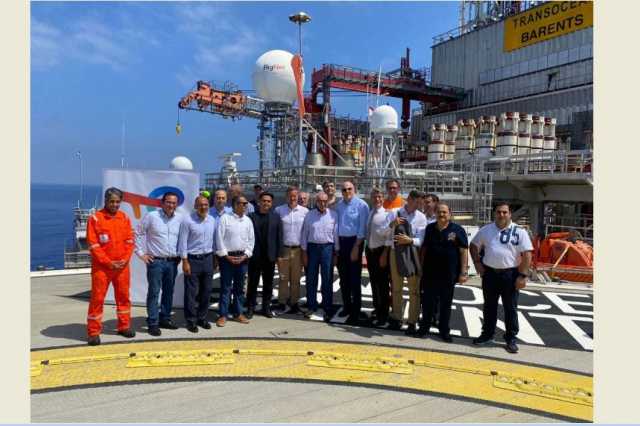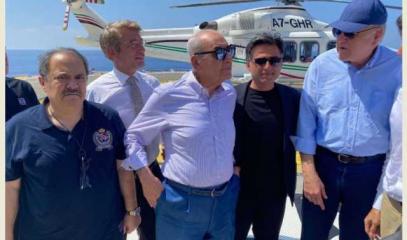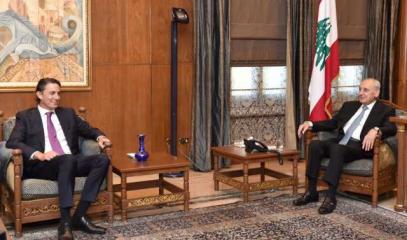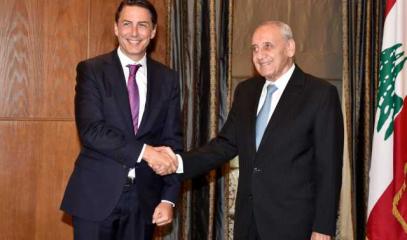Mediterranean border and hydrocarbon up for grabs between Lebanon and Israel
U.S. diplomat Hochstein visiting the Middle East region to unblock impasse. The demarcation of maritime borders between the two countries and land borders at stake, with the knot tied to the so-called "B1 Point." In the background are Tehran's aims, the energy issue and the exploitation of resources that fuel global conflicts.
Beirut (AsiaNews) - A delicate game is underway in the eastern Mediterranean region, in which the supply of natural gas for Europe and the economic security of the Old Continent are at stake, which is weighed down by the prospect of an indefinite extension of the war in Ukraine.
According to various observers, this is precisely the main reason for the visit to Lebanon - and subsequently to Israel - by US diplomat Amos Hochstein, special envoy for international energy affairs.
In total, there are four meetings on the agenda of the US diplomat's visit to Lebanon, which began yesterday and ends today: with the Speaker of Parliament Nabih Berry; with outgoing Prime Minister Nagib Mikati; with Energy Minister Walid Fayad; with the army commander Joseph Aoun, the latter among the candidates for the presidency of the Republic a figure that has been vacant for some time and linked to the political, institutional and economic crisis that is affecting the country of cedars. Also on the agenda is a visit to the southern border, before traveling to Israel.
Hochstein's arrival coincides with the start of drilling operations in block 9 of the Lebanese Exclusive Economic Zone, the so-called Cana field, which borders Israel's territorial waters. It is one of the most promising fields in terms of potential exploitation and on which Total Energies, leader of the consortium which also includes the Italian Eni and QatarEnergy, is aiming to supply Europe.
According to the vice-president of the Chamber Elias Bou Saab, Total Energies will also follow, at a later stage, the process of assigning exploration and exploitation licenses for blocks 8 and 10, further north of Cana, in the eastern Mediterranean.
In recent days, the Speaker of the Chamber Berry and Prime Minister Mikati personally witnessed the start of drilling work from the platform. In private, according to people close to him, the Speaker of the House would have thanked Hochstein "for keeping his word and bringing the 2022 border delimitation process between Lebanon and Israel to its executive phase, with the start of the drilling process ”.
The architect of this agreement, Hochstein, will therefore complete his work on the maritime borders between Lebanon and Israel by delimiting the land border as well; in the latter case it must be kept in mind that the latter are already defined by the Paulet-Newcomb agreement of 1923 (between Lebanon and Palestine, then under British mandate), and that they only need to be "marked" on the ground. The central issue here concerns Lebanon's last point of land, on the sea side. During the delimitation of the maritime border this point, known as "Point B1", remained unresolved, as well as a sea zone dependent on it. “If the Israelis recognize Lebanon's right on this point, the entire issue could be resolved,” assures the senior Lebanese official quoted above.
Hochstein must then ease the tension between Hezbollah and Israel, which also involves the role of the United Nations international peacekeeping force in the land of cedars, Unifil. The pro-Iranian Shiite party is trying to limit the freedom of movement of the UN military and to bind it to the constant accompaniment of the Lebanese army in all its inspection missions. The diplomatic battle is being played out in the United Nations General Assembly, with today's vote on the annual renewal of the force's mandate.
Present in Lebanon since 1978, the Unifil force, made up of almost 10,000 soldiers, acts as a buffer between Israel and Lebanon. Hassan Nasrallah accuses the United States of wanting to turn UN soldiers into "spies" on behalf of Israel.
The Hezbollah leader is doing everything to intimidate this force, which Nabih Berry, however, considers essential. For his part, Unifil is responsible for compliance with United Nations Resolution 1701. This specifies that only the Lebanese army must be present south of the Litani River, the area of operation of the United Nations military.
In political circles it is believed that Hezbollah is "playing" the Unifil card to gain advantages in other sectors. In particular, he is seeking approval - in exchange for silence - for the construction of a power plant in southern Lebanon, as well as other benefits directly linked to the production of gas from the Cana field.
As can be seen, stability in this economically strategic region has a political, indeed geopolitical, price that goes beyond the occasional crises that arise. President Emmanuel Macron spoke to the French ambassadors gathered at the Elysée for the annual meeting of Iranian "interference" - meaning blockades by this term - in the presidential elections in Lebanon. A position that has been vacant in the country of cedars since October 2022, when it expired










.png)










